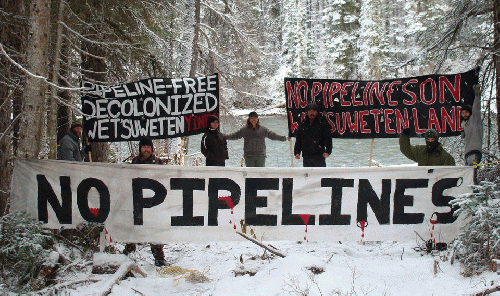FROM TEXAS TO QATAR, U.S. DOES NOTHING TO PROTECT THE
PLANET
By William Boardman Email address removed
In East Texas, members of the Tar Sands Blockade started their eleventh week of opposition to construction of the Keystone XL Pipeline with a new act of civil disobedience against the onrush of global warming, sealing themselves inside a mile-long segment of the pipeline itself.
In Doha, Qatar, other protestors at the U.N. World Climate Conference found themselves in just as dark and unyielding a metaphorical tunnel: the mindset of the globally powerful who appear unwilling to act to mitigate the human suffering they're already perpetrating on millions of the less powerful people around the world.
In Texas and Qatar alike, the role of the United States government is to stand aside as if helpless, while covertly, and not so covertly, encouraging the forces driving the plant's temperature to lethal levels. At the climate conference, the U.S. was sharply criticized for failing to take the lead on planet protection, especially in light of its standing as the world's worst polluter.
Among the top 20 developed countries, only one -- Japan -- spends more on fighting climate change than on subsidizing fossil fuels. The country most out of balance is the United States. The U.S. has pledged about $300,000 million -- half of Japan's amount -- for mitigating climate change. The U.S. spends about four times as much -- $1.2 billion -- subsidizing oil, coal, gas, and other fossil fuels.
Canada Was Once a Leader, Now It Has Shale
Oil
Canada, home of the tar sands oil shale that scientists say may spell "game over" for the climate, also came in for condemnation in Doha. Celine Charveriat, director of advocacy and campaigns for Oxfam International, called Canada a major villain for blocking progress at the conference:
(Note: You can view every article as one long page if you sign up as an Advocate Member, or higher).






